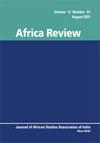私有化政策与加纳黄金采矿业
IF 0.5
Q4 AREA STUDIES
引用次数: 0
摘要
世界银行和国际货币基金组织(IMF)帮助境况不佳的发展中经济体解决债务和经济危机。然而,为了获得这种帮助,这些国际金融机构(IFI s)过去曾要求进行被称为结构调整计划(SAP)的改革。SAP的政策之一是国有企业的私有化(SOE s),加纳从1983年开始接受并实施。本文评估了加纳黄金采矿业的私有化(黄金采矿业是加纳第二大外汇收入来源,也是该政策的主要受益者)。本研究主要利用学术和大众文献、加纳矿业商会(Ghana Chamber of Mines)和内部人士账户的数据,揭示了该政策带来了收益(组织和国家收益)和成本(社会和国家成本)。文章呼吁世界银行/国际货币基金组织和黄金采矿业重申其承诺,承认对公民的社会和环境效益。本文章由计算机程序翻译,如有差异,请以英文原文为准。
Privatisation Policy and the Ghanaian Gold Mining Industry
The World Bank and International Monetary Fund (IMF) help ailing developing economies to address their debts and economic crises. To receive this help, however, these international financial institutions (IFI s) have in the past demanded reforms, termed Structural Adjustment Programmes (SAP). One of the SAP policies has been the privatisation of state-owned enterprises (SOE s), which Ghana embraced and implemented from 1983. This article evaluates Ghana’s privatisation of the Ghanaian gold mining industry (the second-largest foreign-exchange earner and major beneficiary of the policy). Using predominantly academic and popular literature, data from the Ghana Chamber of Mines and insider accounts, this study reveals that the policy has resulted in benefits (organisational and national gains) and costs (social and national costs). The article calls on the World Bank/IMF and the gold mining industry to renew their commitment to the recognition of the social and environmental benefits to the citizens.
求助全文
通过发布文献求助,成功后即可免费获取论文全文。
去求助
来源期刊

Africa Review
AREA STUDIES-
CiteScore
1.80
自引率
12.50%
发文量
22
期刊介绍:
Africa Review is an interdisciplinary academic journal of the African Studies Association of India (ASA India) and focuses on theoretical, historical, literary and developmental enquiries related to African affairs. The central aim of the journal is to promote a scholarly understanding of developments and change in Africa, publishing both original scholarship on developments in individual countries as well as comparative analyses examining the wider region. The journal serves the full spectrum of social science disciplinary communities, including anthropology, archaeology, history, law, sociology, demography, development studies, economics, education, gender studies, industrial relations, literature, politics and urban studies.
 求助内容:
求助内容: 应助结果提醒方式:
应助结果提醒方式:


